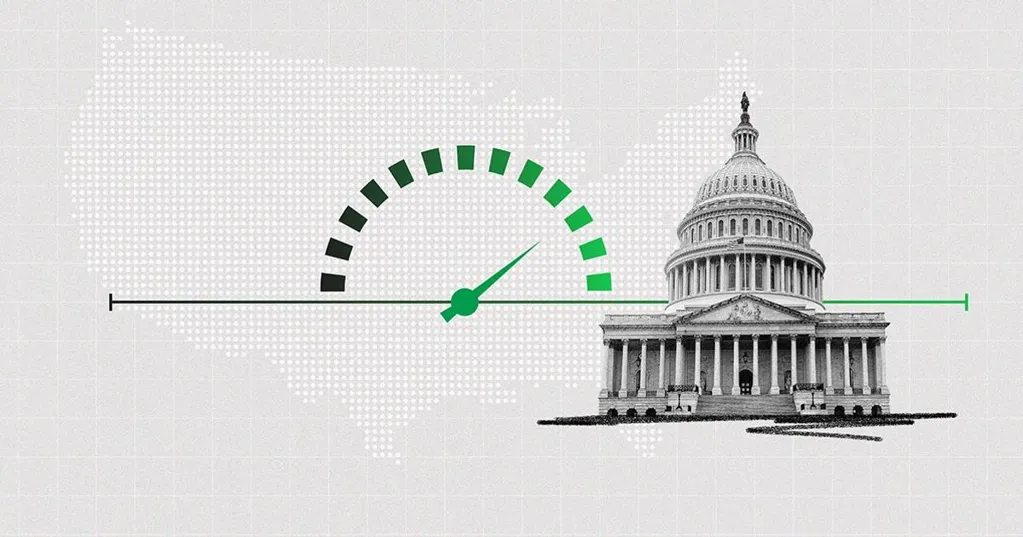WASHINGTON, D.C. -- Does the U.S. government have too much power? The answer to that question, according to the American public, is yes.
Sixty-two percent of Americans say the federal government has too much power, with most of the rest saying the government's power is about right. This latest reading, the first in President Donald Trump's second term, is up from 51% a year ago and is the highest in Gallup's trend since 2002, by two percentage points. The prior high was 60%, recorded during Barack Obama's second term, in 2013 and 2015. The current figure is also well above the 53% average "too much power" reading since Gallup first asked the question in 2002.
Views about government power have shifted significantly over the past 23 years.
The uptick this year in views that the government has too much power reflects shifts among partisan groups. Democrats (and Democratic-leaning independents) have become much more likely to say the government has too much power, surging to 66% from 25% in the past year. Republicans have moved in the opposite direction but to a lesser degree, falling to 58% from 75% last year.
As a result, this marks the first time since the years 2003-2007 that Democrats have been more likely than Republicans to say the government has too much power.
Still, even now, Democrats' belief that the government is too powerful is lower than the 74% to 82% of Republicans who viewed the government as having too much power during the Obama and Biden administrations.
Another aspect of the role of government that Gallup tracks asks the public to say whether the government "is trying to do too many things that should be left to individuals and businesses" or the government "should do more to solve our country's problems."
Currently, 51% of Americans say the government is doing too much, while 40% say it is doing too little. This nearly matches the long-term averages.
There have been only four times in the past 33 years when the public has chosen the more active government alternative over the "government doing too much" choice. These occurred in 1992 and 1993 when the government was coming out of a recession; in 2001 after 9/11; and in 2020 during the COVID-19 pandemic. But in each instance, Americans soon drifted back to the long-term pattern of saying the government is doing too much.
Unlike what is observed on the measure of government power, the percentage of Americans choosing the "government doing too much" alternative dropped by a few points from last year. This year's figure is not too far off from what was observed while Joe Biden was president (albeit with a slightly higher percentage now expressing no opinion).
There is the expected partisan gap in responses to this question about the government's role in society.
Republicans are, not surprisingly, slightly less likely to say the government is doing too much when a Republican is in the White House (Bush administration and the first Trump term) and somewhat more likely when there is a Democratic president (Obama and Biden administrations).
This year, with a Republican back in office, Republicans are slightly less likely than in 2024 to say the government is doing too much, while Democrats have moved the same amount in the opposite direction. But these changes are nowhere near as great as seen on the measure of government power.
In the years since 9/11 began to fade as an influence on public attitudes toward the government, these two questions about the role of government have reflected an underlying and mostly enduring public perception: The federal government has too much power and tries to do too much that should be left to individuals and businesses.
As is true for so many aspects of American life today, preferences about government power and the role of government are strongly partisan. Republicans tend to be the most concerned about the federal government having too much power, while Democrats are usually less so.
These underlying historical patterns make the sharp increase in this year's percentage of Democrats saying the government has too much power all the more notable. Democrats are, no doubt, reacting to the Trump administration's actions and unprecedented expansion of the use of government power. Their reactions are much stronger than those during the Bush administration and Trump's first term. As a result, for the first time in almost two decades, Democrats are more worried than Republicans about the federal government being too powerful.
Democrats' responses to the question asking about the more general role of government in solving the nation's problems do not show the same type of change this year. In short, Democrats' views that the government has too much power have jumped up significantly, while their views that the government is doing too much that should be left to individuals and businesses have remained relatively stable. Without experimental research, it is impossible to say exactly why the two questions evoke such different reactions. But it may be that even though the "doing too much" question is phrased in terms of what is happening now, the wording of the "government should do more to solve our country's problems" alternative evokes generally positive reactions from Democrats who interpret it as a general, philosophic principle.
